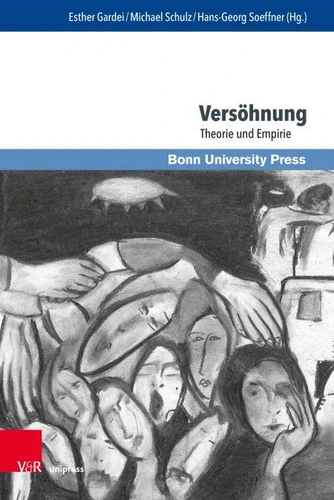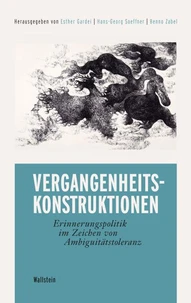Versöhnung. Theorie und Empirie
Par : , , , ,Formats :
Disponible dans votre compte client Decitre ou Furet du Nord dès validation de votre commande. Le format PDF est :
- Compatible avec une lecture sur My Vivlio (smartphone, tablette, ordinateur)
- Compatible avec une lecture sur liseuses Vivlio
- Pour les liseuses autres que Vivlio, vous devez utiliser le logiciel Adobe Digital Edition. Non compatible avec la lecture sur les liseuses Kindle, Remarkable et Sony
 , qui est-ce ?
, qui est-ce ?Notre partenaire de plateforme de lecture numérique où vous retrouverez l'ensemble de vos ebooks gratuitement
Pour en savoir plus sur nos ebooks, consultez notre aide en ligne ici
- Nombre de pages334
- FormatPDF
- ISBN978-3-8470-1588-8
- EAN9783847015888
- Date de parution12/06/2023
- Protection num.pas de protection
- Taille8 Mo
- Infos supplémentairespdf
- ÉditeurV&R Unipress
Résumé
Covid-19, Klimawandel, Populismus oder Digitalisierung und zuletzt der Ukraine-Krieg machen die Frage nach der Möglichkeit und Unmöglichkeit von Versöhnung zu einem der relevantesten Themen unserer Zeit. Dieser Band beschäftigt sich mit der herausragenden gesellschaftlichen Bedeutung von Versöhnung aus interdisziplinärer Perspektive. Das unterschiedliche Verständnis von Versöhnung, Versöhnungsprozesse und auch die Grenzen von Versöhnung werden auf der Basis von Fallstudien untersucht, die folgende Fragestellungen diskutieren: Welche Begriffsäquivalente werden in anderen Kulturen und Religionen verwendet? Wie, wann und warum wird in unterschiedlichen Kulturen »Versöhnung« - nach einem Waffenstillstand oder einem ersten öffentlichen Bekenntnis zum Frieden - erreicht? Worin besteht der >Mehrwert< von Versöhnung gegenüber einem Friedensvertrag? Kann es am Ende von Konflikttransformationsprozessen zu einer dauerhaften Versöhnung kommen?
Covid-19, climate change, populism or digitalization and most recently the Ukraine war made the question of the possibility and impossibility of reconciliation one of the most relevant topics of our time.
The book deals with the outstanding social significance of reconciliation from an interdisciplinary perspective. The researchers compare and discuss the understanding of reconciliation in theology, philosophy, law and social sciences, in history and art history. In addition, reconciliation processes and also the limits of reconciliation are examined on the basis of case studies. The contributions aim at answering the following questions: Which conceptual equivalents are used in other cultures and religions instead of the Christian or the secularized, political, 'Western' concept of reconciliation? How, when and why is 'reconciliation' - after a ceasefire or a first public commitment to peace - achieved in different cultures? What is the 'added value' of reconciliation over a peace agreement? Can lasting reconciliation occur at the end of conflict transformation processes? The questions will be discussed in the series against the background of the tension between reconciliation and irreconcilability.
The book deals with the outstanding social significance of reconciliation from an interdisciplinary perspective. The researchers compare and discuss the understanding of reconciliation in theology, philosophy, law and social sciences, in history and art history. In addition, reconciliation processes and also the limits of reconciliation are examined on the basis of case studies. The contributions aim at answering the following questions: Which conceptual equivalents are used in other cultures and religions instead of the Christian or the secularized, political, 'Western' concept of reconciliation? How, when and why is 'reconciliation' - after a ceasefire or a first public commitment to peace - achieved in different cultures? What is the 'added value' of reconciliation over a peace agreement? Can lasting reconciliation occur at the end of conflict transformation processes? The questions will be discussed in the series against the background of the tension between reconciliation and irreconcilability.
Covid-19, Klimawandel, Populismus oder Digitalisierung und zuletzt der Ukraine-Krieg machen die Frage nach der Möglichkeit und Unmöglichkeit von Versöhnung zu einem der relevantesten Themen unserer Zeit. Dieser Band beschäftigt sich mit der herausragenden gesellschaftlichen Bedeutung von Versöhnung aus interdisziplinärer Perspektive. Das unterschiedliche Verständnis von Versöhnung, Versöhnungsprozesse und auch die Grenzen von Versöhnung werden auf der Basis von Fallstudien untersucht, die folgende Fragestellungen diskutieren: Welche Begriffsäquivalente werden in anderen Kulturen und Religionen verwendet? Wie, wann und warum wird in unterschiedlichen Kulturen »Versöhnung« - nach einem Waffenstillstand oder einem ersten öffentlichen Bekenntnis zum Frieden - erreicht? Worin besteht der >Mehrwert< von Versöhnung gegenüber einem Friedensvertrag? Kann es am Ende von Konflikttransformationsprozessen zu einer dauerhaften Versöhnung kommen?
Covid-19, climate change, populism or digitalization and most recently the Ukraine war made the question of the possibility and impossibility of reconciliation one of the most relevant topics of our time.
The book deals with the outstanding social significance of reconciliation from an interdisciplinary perspective. The researchers compare and discuss the understanding of reconciliation in theology, philosophy, law and social sciences, in history and art history. In addition, reconciliation processes and also the limits of reconciliation are examined on the basis of case studies. The contributions aim at answering the following questions: Which conceptual equivalents are used in other cultures and religions instead of the Christian or the secularized, political, 'Western' concept of reconciliation? How, when and why is 'reconciliation' - after a ceasefire or a first public commitment to peace - achieved in different cultures? What is the 'added value' of reconciliation over a peace agreement? Can lasting reconciliation occur at the end of conflict transformation processes? The questions will be discussed in the series against the background of the tension between reconciliation and irreconcilability.
The book deals with the outstanding social significance of reconciliation from an interdisciplinary perspective. The researchers compare and discuss the understanding of reconciliation in theology, philosophy, law and social sciences, in history and art history. In addition, reconciliation processes and also the limits of reconciliation are examined on the basis of case studies. The contributions aim at answering the following questions: Which conceptual equivalents are used in other cultures and religions instead of the Christian or the secularized, political, 'Western' concept of reconciliation? How, when and why is 'reconciliation' - after a ceasefire or a first public commitment to peace - achieved in different cultures? What is the 'added value' of reconciliation over a peace agreement? Can lasting reconciliation occur at the end of conflict transformation processes? The questions will be discussed in the series against the background of the tension between reconciliation and irreconcilability.





